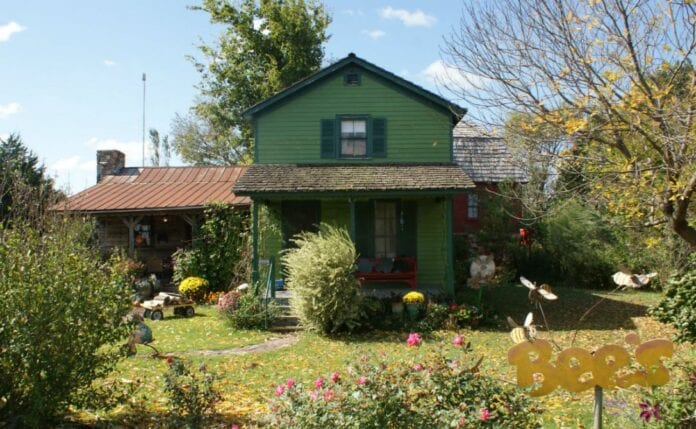Not too long ago, I was winding up my artCentral work day when my cell phone rang. “Do you want to go for a ride?” my husband David asked, as he was about to head home at the end of his own work day. “I’ll be ready when you get here!” was my instant reply.
Soon David arrived and off we went on his vintage 1997 BMW 650 Enduro. Stopping at the Carthage Deli on the Square, over an early dinner we chose our ride’s destination then headed east. Gliding past Kellogg Lake and her lively fountain sending up a bevy of sprays, I happily remembered another eastward trip we made some months ago to the same destination as this evening’s.
Back then on a late January afternoon with light fast fading, two or so miles northeast of Carthage, just off Route 66, David and I arrived at of the old home place of Belle Starr. We were there to fetch one of our well-known local celebrities.
According to Wikipedia, “Myra Maybelle Shirley Reed Starr, better known as Belle Starr, was a notorious American outlaw who associated with the James–Younger Gang and other outlaws. In 1883 she was convicted of the serious crime of horse theft. In a case that is still officially unsolved, Belle Starr was fatally shot in 1889.
Obviously we were not there to pick up Belle. Rather we were waiting for another of our town’s best known personalities. Our mission was to gather and to deliver him to be honored at the Carthage Chamber of Commerce Annual Awards gala.
Dressed in a subduely stunning silver lamé tea-length sheath, Rose, our celebrity’s lovely wife, was first to emerge onto the porch of their home, Belle Starr’s restored house. Lowell Davis, soon to be named Artist-of-the-Year, then appeared in his signature flat driving cap, a woolly plaid muffler draped above his sport coat and black turtleneck he had paired with jeans. As Sophie our granddaughter would say, the two together “looked quite fashion-y!”
At the Awards Banquet, another local artist hero, Andy Thomas, gave a touching tribute as he called Lowell to the stage to the applause of a standing ovation. “He’s done so much for Carthage!” Andy declared. “His work has depicted farm life in America. Thousands and thousands of people from across America have come to Carthage to visit him. They still visit him. You can’t go out and visit without being interrupted by someone who wants to meet him. He is in my eyes the greatest artist I have ever known. He’s one of the greatest people I’ve ever known, and I’ve known some great people.”
Great people attract fans. Lowell is no exception. Lowell is a magnet! On almost any day you can visit his Facebook page and see new photos of Lowell at home spending time with guests. They come to see Lowell, and they come to see Red Oak II, the enchanting, artful village he has created.
Red Oak II (located about eighteen miles from the “old” Red Oak) exists today as Lowell’s painstaking re-creation of the original, where he spent his boyhood before going out into the world. The first Red Oak, Missouri, like many other rural agricultural towns across the country, started to fade sometime after World War II when people began to move to the cities. In the 1970’s, Lowell returned home to find his beloved hometown all but vanished.
What did he do to assuage the loss of the place and the simpler times so dear to him? He made art—his paintings and sculptures and Red Oak II. Lowell found and bought homes and businesses from the original Red Oak town site and other lost villages; he moved them to Red Oak II; and he restored their “grandeur”.
With respect for their evening privacy, David and I left off paying a call to Lowell and Rose and began our walkabout. We admired the old vehicles randomly scattered about as though frozen in time, their Belle Star House, a Phillips 66 station and an old schoolhouse; a feed store, the church and a diner; and a town hall, jail and several homes. Two buildings of special personal significance for Lowell are the General Store run by Lowell’s father and where he learned to sculpt and paint and the blacksmith shop where his great-grandfather once practiced his trade.
As Lowell’s chickens scurried back and forth across the dirt track before us, we were reminded that our own flock would soon be ready to be shut in their coop for the night. Donning our helmets we climbed back on the Beemer. Passing the Belle Star cottage we delighted at our celebrity sighting. Lowell was sitting on his porch, wearing his flat driving cap and a cravat smartly knotted at his neck. He smiled and raised his fly swatter in a wave as we passed by to start our journey home.


















